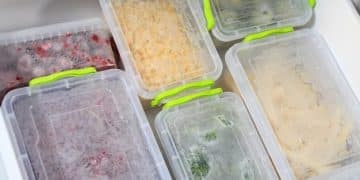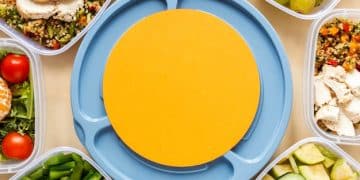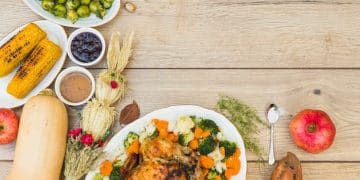Road Trip Meal Planning: Healthy, Convenient Options on the Go
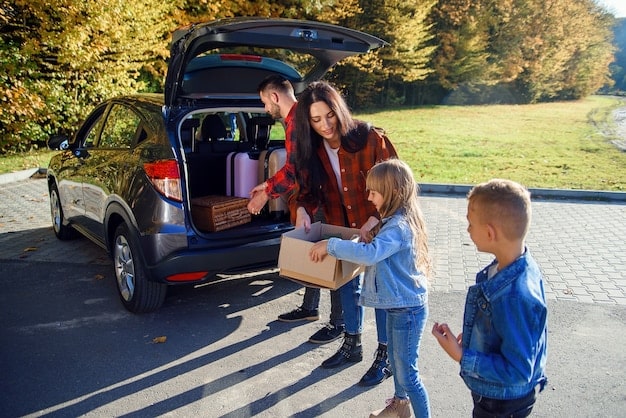
Meal planning for a road trip involves creating a strategic plan for healthy and convenient food options, ensuring you maintain a balanced diet, save money, and avoid unhealthy fast food choices while on the go.
Planning your meals for a road trip is essential for maintaining a healthy lifestyle while enjoying the freedom of the open road. Discover how to meal plan for a road trip with healthy and convenient options that will keep you energized and satisfied throughout your journey, making your travel experience enjoyable and stress-free.
Why Meal Planning is Essential for Road Trips
Embarking on a road trip can be an exciting adventure, but it also presents unique challenges when it comes to maintaining a healthy diet. Meal planning is a crucial aspect of ensuring that you have nutritious and convenient food options available throughout your journey.
Health Benefits
One of the primary reasons to meal plan for a road trip is the significant health benefits it offers. By pre-planning your meals, you can avoid the temptation of unhealthy fast food and processed snacks that are often the most readily available options on the road.
- Nutrient-Rich Foods: Planning allows you to pack nutrient-rich foods such as fruits, vegetables, whole grains, and lean proteins, which provide sustained energy and keep you feeling full and satisfied.
- Avoid Processed Foods: You can minimize your intake of processed foods high in sodium, sugar, and unhealthy fats, which can lead to energy crashes and other health issues.
- Maintain a Balanced Diet: A well-planned meal strategy helps you maintain a balanced diet, ensuring you get the vitamins, minerals, and fiber your body needs to stay healthy and energized.
Cost Savings
Eating out can quickly drain your travel budget. Preparing your own meals and snacks is a cost-effective strategy that allows you to allocate your resources to other enjoyable aspects of your trip.
- Reduce Restaurant Expenses: You can significantly reduce the amount you spend on meals at restaurants and fast-food chains.
- Bulk Buying: Buying ingredients in bulk before your trip can further cut costs, especially for items like nuts, dried fruits, and granola.
- Control Portions: Planning your meals helps you control portion sizes, preventing overeating and reducing food waste.
Convenience and Time Savings
Having your meals and snacks prepared in advance saves you valuable time and reduces stress during your road trip.
- Avoid Impulsive Stops: With a well-stocked cooler, you’re less likely to make impulsive stops at convenience stores or fast-food restaurants.
- Maximize Travel Time: You can spend more time enjoying your destinations and less time searching for suitable food options.
- Reduce Decision Fatigue: Knowing exactly what you’re going to eat eliminates the stress of deciding what to eat on the fly.
In summary, meal planning for a road trip is essential for maintaining your health, saving money, and enjoying a more convenient and stress-free travel experience. By taking the time to plan ahead, you’re setting the stage for a road trip that’s both enjoyable and nourishing.
Step-by-Step Guide to Road Trip Meal Planning
Creating a road trip meal plan involves several key steps to ensure you have everything you need for a successful and healthy journey. From assessing your needs to packing your cooler, each step is crucial for optimizing your meal strategy.

Assess Your Needs and Preferences
Before you start planning your meals, take some time to assess your specific dietary needs, preferences, and any restrictions you may have. This will help you create a meal plan that is both enjoyable and suitable for your health requirements.
- Dietary Restrictions: Consider any dietary restrictions, allergies, or intolerances within your travel group. Ensure that your meal plan accommodates everyone’s needs.
- Food Preferences: Take into account the food preferences of each traveler. Pack a variety of items to cater to different tastes and avoid monotony.
- Trip Duration: Calculate the duration of your road trip to determine the quantity of food you need to pack. It’s always better to overestimate slightly to avoid running out of essential supplies.
Plan Your Meals and Snacks
Once you have a clear understanding of your needs and preferences, start planning your meals and snacks for each day of your road trip. Consider incorporating a mix of ready-to-eat items and foods that can be easily prepared on the go.
A mix of both pre-prepared meals and snacks as well as items that can be assembled on the go will help maintain the variety and interest
- Breakfast Ideas: Pre-make breakfast burritos, oatmeal cups, or overnight oats. Pack granola bars, fruit, and nuts for quick and easy options.
- Lunch Ideas: Prepare sandwiches, wraps, or salads in portable containers. Include items like hummus, carrot sticks, and cherry tomatoes for added nutrition.
- Dinner Ideas: Plan for meals that can be easily heated or assembled at your destination. Options include pasta salad, chili, or pre-cooked chicken with roasted vegetables.
- Snack Ideas: Pack a variety of snacks to keep hunger at bay between meals. Good choices include trail mix, dried fruit, yogurt tubes, and hard-boiled eggs.
Create a Shopping List
With your meal plan in place, create a detailed shopping list of all the ingredients and supplies you need. This will help you stay organized and avoid forgetting essential items.
- Categorize Your List: Organize your shopping list by grocery store sections (produce, dairy, meat, etc.) to make shopping more efficient.
- Check Your Pantry: Before heading to the store, check your pantry and refrigerator to see what items you already have.
- Quantity of Items: Accurately estimate the quantity of each item you need based on your meal plan to prevent overbuying and food waste.
By following these steps, you can create a well-organized and comprehensive meal plan that ensures you have healthy, convenient, and enjoyable food options throughout your entire road trip. Proper planning is the key to a successful and delicious travel experience.
Healthy and Convenient Road Trip Food Ideas
Choosing the right foods for your road trip is crucial for maintaining a healthy and enjoyable experience. Opting for nutrient-rich items that are easy to pack, store, and consume will keep you energized and satisfied on the road.
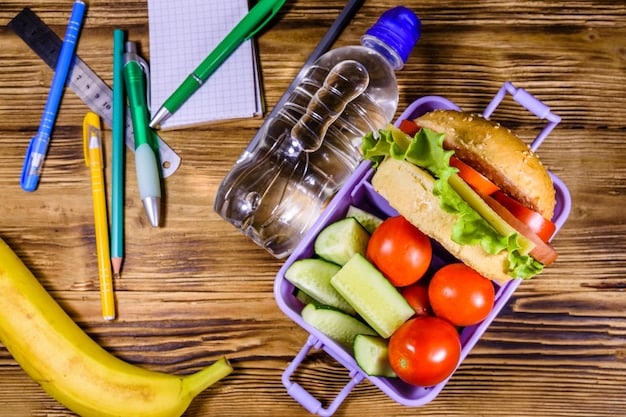
Snacks
Snacks are essential for staving off hunger and maintaining energy levels between meals. Choose snacks that are both nutritious and easy to eat while on the go.
- Fruits: Apples, bananas, grapes, and oranges are portable and provide essential vitamins and fiber.
- Vegetables: Carrot sticks, cherry tomatoes, cucumber slices, and celery sticks are refreshing and can be paired with hummus or guacamole.
- Nuts and Seeds: Almonds, walnuts, pumpkin seeds, and sunflower seeds are packed with healthy fats, protein, and fiber.
Meals to Bring
Packing prepared meals ensures you have healthy and satisfying options readily available, reducing the temptation to rely on fast food.
Pre-making meals can be a great way to ensure you keep to your nutritional needs while on the road
- Sandwiches and Wraps: Whole-grain bread or tortillas filled with lean protein (turkey, chicken, or hummus), vegetables, and healthy spreads like avocado or mustard.
- Salads: Layered salads in jars with dressing at the bottom to keep ingredients fresh. Options include quinoa salad, pasta salad, or mixed green salad with grilled chicken or tofu.
- Hard-Boiled Eggs: A great source of protein that is easy to peel and eat. Boil them before your travels and have them ready to snack on
Hydration
Staying hydrated is just as important as eating healthy. Pack plenty of water and other hydrating beverages, limit sugary drinks
- Water: Bring a reusable water bottle and refill it whenever possible to stay hydrated throughout the day.
- Electrolyte Drinks: Opt for low-sugar electrolyte drinks to replenish essential minerals, especially during hot weather or after physical activity.
- Herbal Teas: Pack tea bags and a thermos to enjoy warm herbal teas.
By incorporating these healthy and convenient food ideas into your road trip meal plan, you ensure that you and your travel companions stay energized, nourished, and satisfied, contributing to a more enjoyable and memorable adventure.
Packing and Storing Food for Optimal Freshness
Properly packing and storing your food is critical to maintaining its freshness and preventing spoilage during your road trip. The right containers and cooling methods can make a significant difference in the quality and safety of your meals.
Choosing the Right Containers
Selecting appropriate containers is essential for keeping your food organized and fresh. Opt for durable, leak-proof containers in various sizes to accommodate different types of meals and snacks.
By using the right container options, you can be assured that your food will remain fresh, and prevent unseemly spills!
- Airtight Containers: These are ideal for storing salads, cut vegetables, and leftovers, preventing them from drying out or absorbing odors.
- Reusable Bags: Great for packing snacks like nuts, dried fruits, and sandwiches. Choose reusable options to reduce waste.
- Mason Jars: Perfect for layered salads, yogurt parfaits, and overnight oats, offering a stylish and eco-friendly option.
Cooling Methods
Keeping your food at a safe temperature is crucial, especially for perishable items like dairy, meat, and eggs. Invest in a high-quality cooler and use effective cooling methods to maintain food safety.
- Ice Packs: Use multiple ice packs to keep the cooler cold. Place them at the bottom and around the sides of the cooler for maximum effectiveness.
- Frozen Water Bottles: Freeze water bottles and use them as ice packs. They will gradually melt, providing cold water to drink.
Organization Tips
A well-organized cooler will make it easier to find what you need and reduce the amount of time the cooler is open, helping to maintain a consistent temperature.
- Layer Your Food: Place heavier items at the bottom and lighter items on top to prevent crushing.
- Separate Raw and Cooked Foods: Keep raw meats and poultry separate from cooked foods to prevent cross-contamination.
By using these packing and storage techniques, you’ll ensure that your food stays fresh, safe, and enjoyable throughout your road trip, making your journey healthier and more satisfying.
Staying Healthy on the Road: Tips and Tricks
Maintaining a healthy lifestyle while on a road trip requires conscious effort and smart planning. Beyond meal preparation, incorporating physical activity, managing food safety, and making informed food choices are essential for your overall well-being.
Hydration Management
Staying hydrated is crucial for maintaining energy levels and overall health. Make hydration a priority throughout your road trip.
- Drink Regularly: Sip water throughout the day, rather than waiting until you feel thirsty.
- Avoid Sugary Drinks: Limit your intake of sugary sodas and juices, which can lead to energy crashes and dehydration.
- Hydrating Foods: Pack foods that are high in water content, such as watermelon, cucumbers, and oranges.
Incorporating Physical Activity
Sitting for extended periods can take a toll on your body. Incorporate regular physical activity to stay energized and prevent stiffness.
Simple ways to integrate physical activites during travel is a great way to stay healthy on the road!
- Plan active stops: Search for places where you can hike or have a picnic so you are getting exercise
- Stretch Regularly: Take short breaks to stretch your legs, arms, and back to improve circulation and reduce muscle tension.
Food Safety Practices
Prioritizing food safety is essential to prevent foodborne illnesses. Follow these guidelines to ensure your food remains safe to eat.
- Keep Coolers Cold: Regularly check the temperature of your cooler and replenish ice packs as needed.
- Avoid Cross-Contamination: Use separate cutting boards and utensils for raw and cooked foods.
- Wash hands regularly: Washing your hands with soap can stop the spread of bacteria and diseases
By integrating these tips and tricks into your road trip routine, you can effectively maintain a healthy lifestyle while enjoying the freedom and adventure of the open road. Prioritize your well-being to ensure a memorable and enjoyable journey.
Dealing with Unexpected Situations
Even with meticulous planning, unexpected situations can arise during a road trip. Knowing how to handle these scenarios, particularly in relation to your meal plan, can help minimize stress and keep you on track.
Adjusting Your Meal Plan on the Fly
Be prepared to adjust your meal plan if unforeseen circumstances delay your travel schedule or alter your route.
- Pack Extra Non-Perishable Foods: Include a supply of non-perishable items like canned goods, dried fruits, and granola bars to supplement your meal plan.
- Utilize Local Resources: If you need to restock, look for local grocery stores or farmer’s markets along your route to replenish your supplies.
Last-Minute Meal Ideas
Have some quick and easy meal ideas in mind in case you need to prepare something on the go with limited resources.
- Simple Sandwiches: Bread, peanut butter, and jelly are easy to pack and require no refrigeration.
- Trail Mix: A combination of nuts, seeds, and dried fruits provides a balanced source of energy and nutrients.
Maintaining a Positive Attitude
Unexpected challenges can be frustrating, but maintaining a positive attitude is essential for enjoying your road trip.
- Flexibility: Be prepared to adapt your plans and make the most of the situation.
- Focus on the Experience: Remember that the journey is just as important as the destination. Embrace unexpected detours!
By anticipating and preparing for unexpected situations, you can handle any challenges that come your way and ensure a smooth and enjoyable road trip. Flexibility, resourcefulness, and a positive attitude will help you navigate unforeseen circumstances with ease.
“`html
| Key Point | Brief Description |
|---|---|
| 🍎 Healthy Eating | Choose fruits, veggies, and lean proteins to avoid unhealthy fast food. |
| 💰 Cost Savings | Pack your own meals and snacks to reduce restaurant expenses. |
| ⏱️ Convenience | Save time by having meals ready, avoiding impulsive stops. |
| ❄️ Proper Storage | Use airtight containers and ice packs to keep food fresh. |
“`
FAQ
▼
Ideally, start planning your meals a week or two before your trip. This gives you time to shop, prep ingredients, and pack everything properly. Last-minute planning can lead to unhealthy choices and added stress.
▼
Overnight oats, breakfast burritos, and yogurt parfaits are all excellent options. You can also prepare hard-boiled eggs or bake a batch of muffins. These can be easily stored to grab and eat on the go.
▼
Use a high-quality cooler with plenty of ice packs or frozen water bottles. Keep the cooler in a shaded area of your car and avoid opening it frequently. Consider bringing two coolers – one for drinks and one for food.
▼
Healthy snack options include fresh fruit, vegetables with hummus, nuts, seeds, and whole-grain crackers. Protein bars or Greek yogurt are also great for keeping hunger at bay. Trail mix is another one that comes in many varieties to suit your tastes.
▼
Involve everyone in the meal planning process. Clearly label allergen-free options and be mindful of cross-contamination. Pack alternative snacks and meals for those with dietary restrictions to ensure everyone has something safe and enjoyable to eat.
Conclusion
Embarking on a road trip requires careful planning, especially when it comes to meals. By focusing on healthy and convenient options, you can ensure a more enjoyable and stress-free travel experience. Taking the time to thoughtfully plan your meals, pack the right snacks, and stay mindful of nutrition will pay dividends throughout your journey, letting you focus on fully enjoying the adventure.
